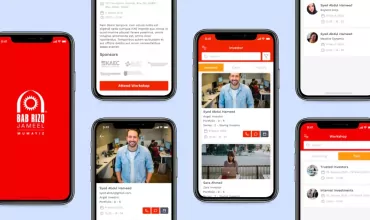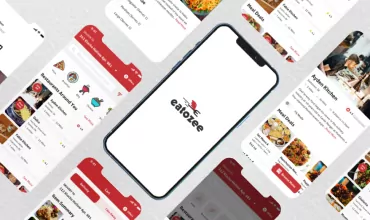Angular vs Blazor

Table of Contents
When it comes to choosing a technology to develop web applications, two powerful options stand in the market: Angular and Blazor. Both are popular frameworks that have a lot to offer.
Angular is a JavaScript-based open-source framework that is used to create single page applications. It’s a great choice for large-scale projects, and it’s also relatively easy to learn.
On the other hand, Blazor, is a .Net based open-source framework that is used to create interactive web applications. It’s great for projects of any size, and it offers a more streamlined development experience.
So which one should you select?
This article is a detailed discussion about both technologies, right from their introductions, features, and advantages to comparison, differences & use cases.
Defining Angular and Blazor
Angular is a popular component-based TypeScript-based frontend framework for building scalable web applications for mobile and desktop. It is a leading front-end development framework which is regularly updated by the Angular team of Google and has a very large support community.
On the other hand, Blazor is a Microsoft ASP.NET Core framework that runs .NET applications in the browser without needing any add-ons or plugins it builds interactive client-side web UI with C# instead of JavaScript.
Which to opt for? Well, your decision should be depending on your specific needs. If you’re looking for a more robust tool that can handle large-scale projects, Angular is probably the way to go. But if you’re looking for a more lightweight and efficient option, Blazor might be the better choice. Either way, you can rest assured that both frameworks will provide you with a powerful and efficient development experience.
Significant Benefits of the Angular framework

1) Great Support Community
When compared to Blazor, the Angular community is far larger. Therefore, more and simpler access to answers for the development issues we confront.
2) Use of TypeScript
Compared to JavaScript, TypeScript has attributes that are far superior. For instance, Angular performs better with code that is clear, intelligible, and predictable.
3) Reusability & maintainability of components
Angular, like Blazor, enables reusability, which saves developers time and effort. It also allows the easy replacement of outdated components with better implementations, making codes updatable within the iterative development workflow.
4) Open-source MVVM framework
Angular distinguishes between user interface controllers and program logic. The Model-view-view model allows users to maintain the structure and order of their projects’ code and easily update, alter, and fix it.
5) Enhanced Design Architecture
Some bigger web apps contain a very large number of components. Angular makes managing these components simpler for developers who lately join the project’s execution.
6) Services and Dependency Injection (DI)
A component or service may occasionally require the use of other dependent services in order to carry out a task. These dependencies are met by employing the Dependency Injection design pattern. It distributes the work among many services. The dependent object will be built and injected by an Angular injector.
7) Custom directives
Custom directives improve HTML functionality and are suitable for dynamic client-side applications. They all start with the prefix NG so that HTML can identify them.
8) Unit-test friendliness
Unit tests, quality assurance procedures aimed at verifying the performance are carried easier thanks to the independent nature of components.
Significant Benefits of Blazor Technology

1) Sharable server side code and client side code
Blazor allows developers to reuse codes between the front end and back end.
2) Dependency injection
Blazor has a useful object called dependency injection that can function as a service. In order to achieve inversion of control, Blazor uses dependency injection in its applications. It enables the provision of dependent items. The Dependency injection in Blazor is divided by three classes: the injector, the client, and the service.
3) Interoperability with JavaScript
In addition to using the interoperability functionality in Blazor WebAssembly to handle DOM manipulations, Blazor’s JavaScript functionality can use browser API calls and enable apps to use .NET methods with JavaScript functions.
4) Interactive web UI Building with C#
With C# we can build apps that run on both the server and a client-side. And this allows the web app developers to share and reuse libraries & codes. Blazor allows developers to build interactive web UIs with the help of CSS, HTML, and C# without having to use JavaScript.
5) WebAssembly and Server Compatibility
Blazor can easily run the client-side C# code into the browser with the help of WebAssembly. It is mostly used when there is a need to transmit client UI events to the server.
6) Web Socket Connections
When the application is capable enough to send messages from a server to the clients in real-time, Blazor uses Web Socket to have an active connection between the client and the Blazor server-side. It sends data via push to the Blazor app’s components in a faster manner.
7) Fast Build/Coding Time
One of the biggest advantages of this web platform is that it is very fast in terms of creating and debugging applications as it uses Visual Studio and the entire experience accumulated with its plugins and tools for creating modern web apps.
When to opt for angular and when to opt for Blazor?
Angular is highly recommended when developing enterprise web applications, Web pages with dynamic content, Progressive web applications, Video streaming apps, e-commerce applications and Real-time Data Application like weather casting apps.
Blazor has proven efficiency in developing web-based components and native mobile UIs.
Conclusion
While Both the languages have their own benefits and drawbacks, Angular has been around for a while, Blazor is still in its early stages and is expected to surprise its users with a lot of new features and use cases.
As a leading software provider, we at IndiaNIC are glad to assist you and deploy our 24 years expertise in selecting the right framework based on your project’s unique requirements.
Frequently Asked Questions on Blazor vs Angular
What about angular’s learning curve?
The learning curve for Angular is relatively high, If you are willing to put some considerable learning effort into Angular to gain the benefits from an efficient, proven framework.
What is the future of Blazor?
If you were considering a Windows desktop application, Blazor is a more future-forward choice. But if you're a business building modern, public web applications, there's very little chance you'll recommend a client start with Blazor today.
When to only opt for blazer?
When the project requires a very fast turnaround time, C# developers can build apps faster with Blazor.
Are apps built with Blazor scalable?
The Blazor Server can scale from small internal line of business apps to large internet scale apps.



